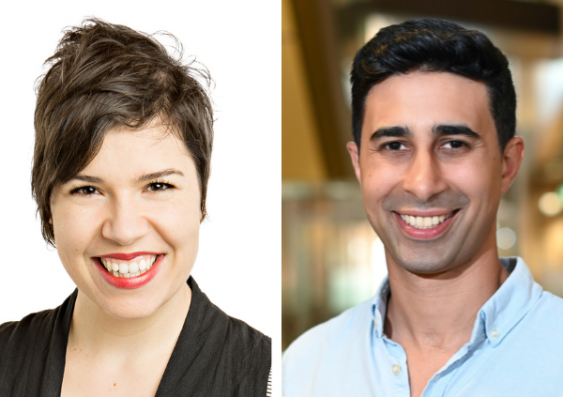UNSW researchers win prestigious Young Tall Poppy Awards 2023
Ursula Sansom-Daly and Murad Tayebjee have been recognised for their work on mental health in young people with cancer and molecular physics to create higher efficiency solar cells.
Ursula Sansom-Daly and Murad Tayebjee have been recognised for their work on mental health in young people with cancer and molecular physics to create higher efficiency solar cells.

Two outstanding young UNSW Sydney researchers have received 2023 Young Tall Poppy Science Awards.
Run by the Australian Institute of Policy and Science (AIPS), the Young Tall Poppy Science Awards honour up-and-coming scientists who combine world-class research with a passionate commitment to communicating science. They are held on a state-by-state basis to celebrate researchers across all areas of science.
AIPS Co-Chair Professor Maria Kavallaris OAM said: “A more scientifically engaged society is something every scientist should aspire to and the reason that Tall Poppy winners are so important.”
Dr Ursula Sansom-Daly, a senior research fellow and Director of the Behavioural Sciences Unit in the School of Clinical Medicine, was recognised for her work addressing the psychological and social impact of cancer for young people and their families. In her dual clinical-research roles, Dr Sansom-Daly focuses on applying evidence-based psychological models and methods to understand and tackle the mental health implications of cancer.
“Every year, around 6000 young Australians aged 15-40 are diagnosed with cancer. Almost half develop symptoms of mental health disorders after finishing cancer treatment and, without access to mental health support, these symptoms can persist for decades into cancer survivorship. As a psychologist and researcher, I am particularly passionate about developing resources and interventions to improve the cancer experience and the way clinical services are delivered,” she said.
Dr Sansom-Daly said the lack of community-based psychologists with cancer expertise creates a ‘postcode lottery’ where the care a person receives depends on where they live. Her current studies include implementing mental health support for adolescent and young adult cancer survivors into community settings via videoconferencing. She is also codesigning advance care planning and palliative care communication support resources for those whose cancer may not be curable. Her programs provided critical online psychological care during COVID-19, which led to several national community organisations – such as Canteen, opens in a new window and Cancer Council NSW, opens in a new window – adopting them on an ongoing basis.
Dr Sansom-Daly said she was delighted to receive the award in recognition of her work. “I’m excited to use the platform this award will give me to really highlight the unique challenges that young people with cancer face. It’s so important we harness strong science communication approaches to make sure the scientific research we do translates into meaningful improvements in the lives of young people dealing with cancer – and their families, friends, and communities.”
Dr Murad Tayebjee, a senior lecturer in the School of Photovoltaic and Renewable Energy Engineering, was recognised for his work developing more efficient photovoltaic (solar) technology and his extensive public outreach in renewable energy education. Dr Tayebjee is world renowned for his work on ‘spin physics in singlet fission’, which involves developing molecules that can absorb sunlight more effectively. His work could increase the efficiency of solar energy conversion by 150 per cent, which would contribute to smaller, cheaper rooftop solar panels in future.
Read more: New environmentally friendly solar panel recycling process helps recover valuable silver
Dr Tayebjee is also a passionate educator, teaching high school and undergraduate students about sustainability. In collaboration with LionsHeart Studios, opens in a new window, the creators of Playconomics, he developed PlayEnergy, a computer game that teaches students about renewable energy and sustainability. A highly effective tertiary education tool, it was also designed to give students a taste of university courses.
Dr Tayebjee said he’s honoured to receive a Young Tall Poppy Award in recognition of his work. “The Young Tall Poppy Award gives me the opportunity to engage more people about science and how we will create a sustainable future.”
Drs Sansom-Daly and Tayebjee will receive their awards at a ceremony in Sydney on 13 September, where the 2023 NSW Young Tall Poppy of the Year will be announced from 12 NSW winners. Read more about the awards, opens in a new window.